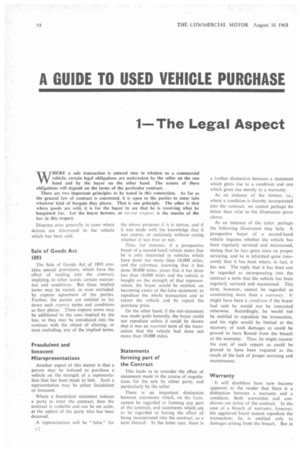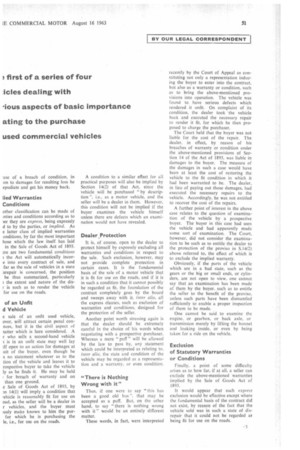A GUIDE TO USED VEHICLE PURCHASE
Page 52

Page 53

If you've noticed an error in this article please click here to report it so we can fix it.
1—The Legal Aspect
IBY OUR LEGAL CORRESPONDENT I WHERE a sale transaction is entered into in relation to a commercial vehicle, certain legal obligations are undertaken by the seller on the one hand and by the buyer on the other hand. The nature of these obligations will depend on the terms of the particular contract.
There are two important principles to be noted in this connection. As far as the general law of contract is concerned, it is open to the parties to enter into whatever kind of bargain they please. That is one principle. The other is that where goods are sold, it is for the buyer to see that he is receiving what he bargained for. Let the buyer beware, or caveat emptor, is the maxim of the law in this respect.
Disputes arise generally in cases where defects are discovered in the vehicle which has been sold.
Sale of Goods Act 1893 The Sale of Goods Act of 1393 contains special provisions, which have the effect of reading into the contract, implying, in other words, certain warranties and conditions. But these implied terms may be varied, or even excluded, by express agreement of the parties. Further, the parties are entitled to lay down such express terms and conditions as they please. These express terms may be additional to the ones implied by the law, or they may be introduced into the contract with the object of altering, or even excluding, any of the implied terms.
Fraudulent and Innocent Misrepresentations Another aspect of this matter is that a person may be induced to purchase a vehicle on the strength of a representation that has been made to him. Such a representation may be either fraudulent or innocent.
Where a fraudulent statement induces a party to enter the contract, then the contract is voidable and can be set aside, at the option of the party who has been deceived.
A representation will be " false" for the above purposes if it is untrue, and if it was made with the knowledge that it was untrue. or recklessly without caring whether it was true or not.
Thus. for instance, if a prospective buyer of a second-hand vehicle states that he is only interested in vehicles which have done not more than 10,000 miles, and the salesman, knowing that it has done 30.000 miles. states that it has done less than 10.000 miles and the vehicle is bought on the strength of that representation, the buyer would be entitled, on becoming aware of the false statement, to repudiate the whole transaction and to return the vehicle and be repaid the purchase price.
On the other hand, if the mis-statement was made quite honestly, the buyer could not repudiate unless it could be shown that it was an essential term of the transaction that the vehicle had done not more than 10.000 miles.
Statements forming part of the Contract This leads us to consider the effect of statements made in the course of negotiations for the sale by either party, and particularly by the seller.
There is an important distinction between statements which, on the facts, cannot be regarded as forming any part of the contract, and statements which are to be regarded as having the effect of being incorporated into the contract, as a term thereof. In the latter case, there is
turther distinction between a statement which gives rise to a condition and one which gives rise merely to a warranty.
As an instance of the former, i.e., where a condition is thereby incorporated into the contract, we cannot perhaps do better than refer to the illustration given above.
As an instance of the latter, perhaps the following illustration may help. A prospective buyer of a second-hand vehicle inquires whether the vehicle has been regularly serviced and maintained, stating that he lays great store on proper servicing, and he is informed quite innocently that it has, been where, in fact, it has not. The reply that it has been can be regarded as incorporating into the contract a term that the vehicle has been regularly serviced and maintained. This term, however, cannot be regarded as constituting more than a warranty. It might have been a condition if the buyer had said he would not be interested otherwise. Accordingly, he would not be entitled to repudiate the transaction, and his right would be limited to the recovery of such damages as could be proved to have flowed from the breach of the warranty. Thus, he might recover the cost of such repairs as could be proved to have been required as the result of the lack of proper servicing and maintenance, Warranty It will doubtless have now become apparent to the reader that there is a distinction between a warranty and a condition. Both warranties and conditions are terms of the contract. In the case of a breach of warranty. however, the aggrieved buyer cannot repudiate the transaction; he is entitled only to damages arising from the breach. But in
ase of a breach of condition, in on to damages for resulting loss he epudiate and get his money back.
lied Warranties Conditions
other classification can be made of .nties and conditions according as to ier they are express, being expressly d to by the parties, or implied. As e latter class of implied warranties onditions, by far the most important hose which the law itself has laid in the Sale of Goods Act of 1893. ere are two fundamental conditions 1 the Act will automatically incor
e into every contract of sale, and far as the sale of vehicles in a state .srepair is concerned, the position be thus summarized, particularly the extent and nature of the dis r is such as to render the vehicle for use on the roads.
of an Unfit d Vehicle
e sale of an unfit used vehicle, over, will attract certain penal connees, but it is the civil aspect of 'tatter which is here considered. A ✓ who sells a second-hand vehicle is in an unfit state may well lay Of open to an action for damages at uit of the buyer, even though he s no statement whatever as to the tion of the vehicle and leaves it to respective buyer to take the vehicle ly as he finds it. He may be held ; for breach of warranty and on than one ground.
e Sale of Goods Act of 1893, by m 14(1) will imply a condition that 'chicle is reasonably fit for use on oad, as the seller will be a dealer in ✓ vehicles, and the buyer must )usIy make known to him the purfor which he is purchasing the le, i.e., for use on the roads. A condition to a similar effect for all practical purposes will also be implied by Section 14(2) of that Act, since the vehicle will be purchased "by description ", i.e., as a motor vehicle, and the seller will be a dealer in them. However, this condition will not be implied if the buyer examines the vehicle himself unless there are defects which an examination would not have revealed.
Dealer Protection
It is. of course, open to the dealer to protect himself by expressly excluding all warranties and conditions in respect to the sale. Such exclusion, however, may not provide complete protection in certain cases. It is the fundamental basis of the sale of a motor vehicle that it is fit for use on the roads. and if it is in such a condition that it cannot possibly be regarded as fit. the foundation of the contract completely goes by the board and sweeps away with it. inter alio, all the express clauses, such as exclusion of warranties and conditions, designed for the protection of the seller.
Another point worth stressing again is that the dealer should be extremely careful in the choice of his words when negotiating with a prospective purchaser. Whereas a mere " puff " will be allowed by the law to pass by, any statement which could be interpreted as relating to, inter olio, the state and condition of the vehicle may be regarded as a representation and a warranty. or even condition.
"There is Nothing Wrong with it"
Thus, if one were to say " this has been a good old bus ", that may be accepted as a puff. But, on the other hand, to say "there is nothing wrong with it" would be an entirely different matter.
These words, in fact, were interpreted recently by the Court of Appeal as constituting not only a representation inducing the buyer to enter into the contract, but also as a warranty or condition, such as to bring the above-mentioned provisions into operation. The vehicle was found to have serious defects which rendered it unfit. On complaint of its condition, the dealer took the vehicle back and executed the necessary repair to render it fit, for which he then proposed to charge the purchaser.
The Court held that the buyer was not liable for the cost of the repair. The dealer, in effect, by reason of his breaches of warranty or condition under the above-mentioned provisions of Section 14 of the Act of 1893. was liable in damages to the buyer. The measure of the damages in such a case would have been at least the cost of restoring the vehicle to the fit condition in which it had been warranted to be. The dealer, in lieu of paying out those damages, had executed the necessary repairs to the vehicle. Accordingly, he was not entitled to recover the cost of the repairs.
A further point of interest in the above case relates to the question of examination of the vehicle by a prospective buyer. The buyer in this case had seen the vehicle and had apparently made some sort of examination. The Court, however, did not consider the examination to be such as to entitle the dealer to the protection of the proviso in S.14(2) above referred to, the effect of which is to exclude the implied warranty.
Obviously, lithe parts of the vehicle which are in a bad state, such as the gears or the big or small ends, or cylinders, are not open to view, one cannot say that an examination has been made of them by the buyer, such as to entitle the seller to the benefit of the proviso, unless such parts have been dismantled sufficiently to enable a proper inspection of them to be made.
One cannot be said to examine the engine, or gearbox. or back axle, or transmission merely by lifting the bonnet and looking inside, or even by being taken for a ride on the vehicle.
Exclusion of Statutory Warranties or Conditions
Finally, a point of some difficulty arises as to how far, if at all, a seller can exclude the above-mentioned warranties implied by the Sale of Goods Act of 1893.
It would appear that such express exclusion would be effective except where the fundamental basis of the contract did not exist, by reason of the fact that the vehicle sold was in such a state of disrepair that it could not be regarded as being fit for use on the roads.












































































































